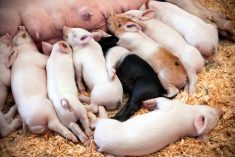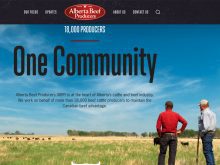Record keeping under a mandatory country-of-origin labelling law could
cost the American food industry up to $2 billion a year.
A United States Department of Agriculture report said $1 billion of
that cost will be borne by the red meat industry. Complete traceback
must be provided to prove all cattle and hogs are born, raised and
slaughtered in the U.S.
“They are shooting their own red meat producers in the foot,” said
Larry Martin of the George Morris Centre. The Guelph, Ont., firm was
Read Also

Dennis Laycraft to be inducted into the Canadian Agricultural Hall of Fame
Dennis Laycraft, a champion for the beef industry, will be inducted into the Canadian Agricultural Hall of Fame this fall.
contracted by Manitoba Pork to study the potential impacts of the U.S.
law slated to become mandatory in 2004.
The USDA report, issued Nov. 21, estimates the greatest cost is in
record keeping for all commodities covered by the program. These
include beef, veal, lamb, pork, fish, produce and peanuts. The greatest
cost will be borne by American producers at $1 billion per year. Food
handlers can expect added costs of $340 million and retailers $628
million.
Retailers face fines of up to $10,000 for mislabelled products.
The regulations are part of the U.S. Farm Bill and could actually offer
a cost advantage to foreign packers who will sell processed items
carrying the label “Product of Canada.” These only require a customs
declaration rather than complete records of movement on all animals.
Nevertheless, a mandatory labelling requirement could still devastate
the Canadian livestock industry because of its heavy reliance on the
American market.
It could halt the export of five million weaner pigs per year. American
producers may decide to build their own sow barns or the animals may
stay in Canada to be processed here. Martin told the Alberta Pork
annual meeting that processing here is more beneficial because the pork
would leave as a higher value product.
Interviews with American packers and retailers indicate they are not
likely to separate the Canadian animals or product because of the added
cost and labour involved.
“Retailers said it is a huge cost that will generate no useful
information for anyone,” said Martin.
About eight percent of the pork consumed in the U.S. is Canadian.
The George Morris study said the American law could force 450 Canadian
hog farmers out of business, with a loss of $350 million in farm income
if no contingency plans are made. The market for 250,000 acres of
cropland could be lost and a packing plant could close.
This uncertainty does not encourage new investment in value adding in
Canada and banks may be reluctant to finance livestock expansion.
Canada does have the ability to increase processing if existing plants
add double shifts of workers. That would cost more and create a
challenge in finding enough workers.
This law could also change the way hogs are priced. Packers may look at
a different pricing mechanism that is not based on U.S. prices.
Martin argues aspects of the farm bill are illegal under World Trade
Organization rules. He suggested a legal challenge be considered as
soon as possible.
It is important for livestock groups to continue working together
against this bill. They need to ally with American groups already
opposed to it.
He suggested a good strategy would be to explain why it hurts Americans
rather than complain it harms Canada. The Americans do not care if it
hurts Canada.
Canada must also continue to shift away from its heavy reliance on the
U.S. market.















